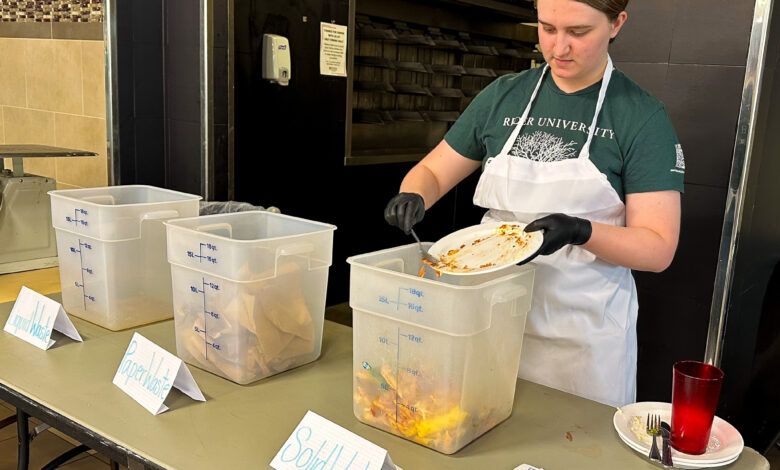
The weight of waste during lunchtime at Daly’s
By Grace Bertrand
As students finished up their lunch at Daly Dining Hall on Feb. 22 and headed to the trash corridor to throw away their leftover food, they were met at the doorway by three Eco Reps from Rider’s BroncsGoGreen in aprons and gloves waiting to dispose of the plates’ contents themselves.
“Weigh the Waste” is an annual event on campus in collaboration with a national waste-reduction competition called “Campus Race to Zero Waste,” that tracks and records all the food waste accumulated during a 90-minute lunch period.
Students’ food waste was collected and separated into different bins, labeled liquid, paper or solid and weighed at the end of the period.
During that time alone, 16 pounds of solid waste, 10 pounds of liquid waste and 6 pounds of paper waste from students’ plates were accounted for.
“Sadly, it baffles me, but it doesn’t anymore,” said sophomore acting major Skyler O’Kelley. “As an Eco Rep, I see stuff like that all the time.”
‘Campus Race to Zero Waste’
“Campus Race to Zero Waste,” abbreviated as CR2ZW and formerly known as “Recyclemania,” is an eight-week friendly competition for universities across the country to promote waste reduction and encourage students to recycle more.
Over the eight-week period, colleges across the United States and Canada record and report the amount of trash and recycling collected every week and are then placed into a range of categories based on how much was recycled on a per capita basis.
Since 2001, CR2ZW has involved more than 1,000 colleges and universities by providing tools, resources and a little competitive incentive to motivate students and staff to increase recycling efforts and reduce waste generation.
Although Rider does not compete in the national campus competition, they promote education for students about the different waste streams happening in the world, on campus specifically.
“Weigh the Waste” is just a small part of Rider’s participation in this year’s campaign.
Similar to past years, Rider has focused on different types of waste reduction in the first three weeks of February: metals, paper cardboard and food waste.
Rider’s Director of Sustainability, Melissa Greenberg, said, “It’s not just about recycling. We use the campus race as a way to communicate with the Rider community about our various waste streams.”
Efforts in waste reduction
Food waste reduction isn’t new for the university.
Rider Dining has been active in a food waste reduction initiative of its own called the “Waste Not 2.0” program where it tracks and weighs how much food has been wasted by the end of the day such as food scraps, leftovers, expired foods and overproduction.
Rider Dining keeps track of how much food was made and collected by students in order to calculate how much it needs to make the next day.
The problem with this is that oftentimes, students take on more food than they can eat and end up disposing of most of it, which becomes unaccounted for in the production process.
Last year, Daly Dining Hall installed a SEED food waste biodigester manufactured by BioHitech, replacing a previous model that was installed in 2014.
The machine contributes to the university’s overall sustainability efforts and its aspiration to become carbon neutral by 2050 by transforming food waste into gray water, allowing it to be safely discarded into the municipal sewage system.
In cooperation with Waste Management, Daly Dining Hall’s workers collect and compost 90% of the food waste generated to create fertilizer and are able to recycle all fryer grease into biofuel.
Greenberg reports that with the new biodigester comes data collection capability, meaning she now has digital access to the statistics of food waste put in the machine over any time frame.
With this new addition, the new biodigester has been more than successful in recording and diverting as many as 500 pounds of food waste from ending up at landfills per day.
As of Feb. 23, the biodigester has collected 6,797 pounds of food waste just this month, with 75,975 pounds of food waste in the last year.
Referring to the event, O’Kelley said, “I want people to be aware of their food consumption and just how much food goes to waste, because we had 16 pounds of solid food waste in just an hour. Daly’s is open almost 12 hours a day every day.”
Finishing the race
For the past 11 years, the university has been named one of the nation’s most environmentally responsible colleges by The Princeton Review and is consistently recognized for its sustainability efforts.
However, according to Greenberg, when it comes to Rider’s race to zero waste, there is still much more to be done.
“We need to make sure that the students coming into our dining facilities are educated year after year because there was turnover,” Greenberg said. “There’s always a constant cycle of people that need to be informed.”
On pace to meet its sustainability goal, Rider continues its initiatives led by its energy master plan that first established the vision for its green efforts in 2008.
Greenberg hopes to host more events like “Weigh to Waste” in the future and encourages students to be mindful of the amount of food waste they are responsible for in their daily lives.
“I don’t think anybody has to uproot and change their lifestyle,” Greenberg said. “But I think that people can make small, reasonable changes in some aspects of their lives.”


